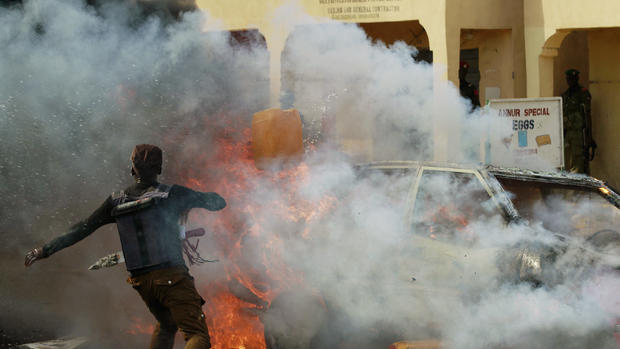Remains found of hundreds believed killed by Boko Haram
MAIDUGURI, Nigeria -- Hundreds of skeletons of children, women and men believed killed by Boko Haram have been found in a recaptured Nigerian border town, indicating another atrocity by the Islamic extremists, witnesses say.
A local government committee that entered northeastern Nigerian town of Damasak through neighboring Niger said it also found decomposing bodies of men presumed to be Boko Haram fighters killed when troops from Chad and Niger recaptured the town in March.
"I know that there was a large-scale atrocity, but I cannot tell you the precise number of dead bodies," Senator-elect Abubakar Kyari on Monday told reporters in Maiduguri, the Borno state capital 110 miles southeast of Damasak, which borders Niger.
The officials visited Damasak on Saturday and found the town littered with bodies, said Babagana Mustapha, spokesman for the Mobbar local government.
Hundreds more bodies of insurgents are rotting in the surrounding bush, according to Chadian troops who escorted the officials through the town.
There have been reports of Boko Haram killing hundreds of civilians as they fled other Nigerian towns, driven out by a Chadian-led multinational offensive that began at the end of January.
Meanwhile, police in north-central Kogi state blamed Boko Haram for an explosion at Ta'o FM Radio station that killed three security guards and a fourth unidentified person on Monday night.
The multinational force has pushed Boko Haram out of all areas of northeastern Nigeria, except for the Sambisa Forest, said military spokesman Maj. Gen. Chris Olukolade.
The forest is where Boko Haram took more than 200 kidnapped schoolgirls a year ago. The forest has been pounded by air raids for weeks and ground troops reportedly entered it last week. Olukolade on Tuesday denied reports that the troops retreated from Sambisa because of land mines.
Boko Haram's Islamic uprising is blamed for the deaths of as many as 10,000 people last year and some 1.5 million people have been forced from their homes.
